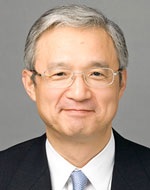Japanese drugmaker Daiichi Sankyo is to spend ¥500 billion ($4.4 billion) on mergers and acquisitions with a major new focus on buying up cancer drugs. The plans come as the company looks to shore up the losses from its blockbuster hypertension drug, set to decimate its balance sheet.
This comes from the Tokyo-based company's newly published 5-year business plan, which estimates that its operating profit will drop by 30 billion yen to just 100 billion yen in fiscal 2017 as the patent expiration of the $2.6-billion-a-year (2014 sales) Benicar (olmesartan medoxomil hydrochlorothiazide) starts to bite, with more patents tumbling next year.
The plan calls for spending the ¥500 billion on M&A deals and a greater focus on the development of new therapy spaces, notably in oncology, as well as a deeper involvement in the U.S., the world's largest pharma market.
 |
| Daiichi Sankyo CEO Joji Nakayama |
CEO Joji Nakayama said the main priority would be acquiring promising cancer drug candidates from its M&A hunt either in Japan or abroad, though not likely India where its escape from a soured 2008 purchase of Ranbaxy Laboratories ended with a move by Mumbai-based Sun Pharmaceutical Industries to buy most of the India company in 2014 for $3.2 billion, helping Daiichi exit.
It will also seek to speed up the marketing of the anticoagulant Savaysa--which it wants to grow to 120 billion yen or more--and other major products in Japan, as well as its Luitpold business, that it acquired back in 2005.
It will likely have an uphill struggle with Savaysa however as it is fourth to a next-gen anticoagulant market that already includes heavyweights Xarelto (rivaroxaban), from Johnson & Johnson ($JNJ) and Bayer; Boehringer Ingelheim's Pradaxa (dabigatran); and Pfizer ($PFE) and Bristol-Myers Squibb's ($BMY) Eliquis (apixaban).
Analysts figure Daiichi's entrant can be built up to $220 million by 2019, but that's not nearly enough to bridge the Benicar gap, and nowhere near the blockbuster peak sales expected of the Big Pharma trio.
Despite Daiichi's positive message, there will still be a significant drop in revenue going forward, and the company admits as much when it says that further profit generation will need to be made "through cost reduction and streamlining [and] enhancing shareholder returns"--corporate code for cuts.
And it wouldn't be the first time it had to wield the ax. Last year the drugmaker said it would be cutting up to 1,200 jobs in the U.S.--about half its workforce in its stateside subsidiary--as well as a second job-cutting drive aimed at reducing its commercial headquarters staff by 16%.
Those cuts coincided with the loss of patent protection on the diabetes and cholesterol drug Welchol, a $500-million-plus seller for Daiichi.
And just yesterday Daiichi announced that 15 workers would be axed from its API plant in Hiratsuka, and that the plant will shutter completely by September.
- check out the release